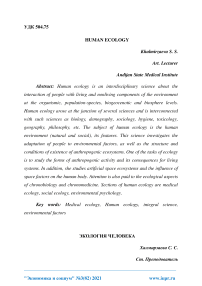Human ecology
Автор: Khalmirzaeva S.S.
Журнал: Экономика и социум @ekonomika-socium
Рубрика: Основной раздел
Статья в выпуске: 3-1 (82), 2021 года.
Бесплатный доступ
Human ecology is an interdisciplinary science about the interaction of people with living and nonliving components of the environment at the organismic, population-species, biogeocenotic and biosphere levels. Human ecology arose at the junction of several sciences and is interconnected with such sciences as biology, demography, sociology, hygiene, toxicology, geography, philosophy, etc. The subject of human ecology is the human environment (natural and social), its features. This science investigates the adaptation of people to environmental factors, as well as the structure and conditions of existence of anthropogenic ecosystems. One of the tasks of ecology is to study the forms of anthropogenic activity and its consequences for living systems. In addition, she studies artificial space ecosystems and the influence of space factors on the human body. Attention is also paid to the ecological aspects of chronobiology and chronomedicine. Sections of human ecology are medical ecology, social ecology, environmental psychology.
Medical ecology, human ecology, integral science, environmental factors
Короткий адрес: https://sciup.org/140258800
IDR: 140258800 | УДК: 504.75
Текст научной статьи Human ecology
Medical ecology is a complex, integral science dealing with the problems of the impact of the human environment on the state of his health and the occurrence of pathology, as well as the use of environmental factors in order to prevent, treat diseases and restore health. Its tasks include the study of the types and forms of the impact of environmental factors, the mechanisms of their action on the human body. Special attention is paid to ecological, or environmental, diseases; the role of environmental factors in the occurrence of malformations, malignant tumors, occupational and other diseases. Medical ecology studies the types of environmental pollutants and the ways of their entry into the human body, diseases resulting from the impact of man-made pollution, for example, minamata disease, "yellow" children, etc. One of the tasks of medical ecology is to assess the degree of risk of environmental pollution at the organismic and population-specific levels in the present and the future, to study the ways and possibilities of self-purification of ecosystems, as well as to develop methods for monitoring the cleanliness of the human environment, principles and methods of conservation and restoration of nature. In addition, medical ecology studies the recreational significance of environmental factors, the recreational possibilities of various natural and anthropogenic ecosystems. Social ecology studies the patterns of interaction between human society and individual groups of people with nature, develops the ecological foundations of rational nature management, methods of nature protection and optimization of the human environment. Environmental Psychology 150 is a multidisciplinary science that studies environmental factors that affect the psyche, human behavior and the consequences of such an impact. And also researches and applies abiotic and biotic factors for the restoration of mental state, as well as for the treatment of people with mental disorders and mental illnesses.
Purpose: To study the structural units of the biosphere and biogeocenosis, environmental factors, and their parameters. Show the main features of the habitat of modern humans and anthropogenic ecosystems. To note the importance of environmental factors in human life, to analyze the types of human adaptation and the main ecological types of people.
Biogeocenosis - Study and disassemble the main components of biogeocenosis, pay attention to their interaction with each other. Note that a person is directly or indirectly closely related to many biogeocenoses.
For each organism there is a certain combination of environmental conditions that is optimal for its growth, existence and reproduction. On both sides of this optimum, biological activity gradually decreases until, finally, its conditions become those in which the organism cannot exist at all. The range of environmental conditions required to maintain a population is much narrower than the range required for the survival of an individual. For the prosperity of a human population, in addition to maintaining the existence of individual individuals, conditions are necessary to ensure growth and reproduction, including social and psychological ones. Give examples of changes in the number and composition of human populations under the influence of anthropic environmental factors.
Individual organisms of a population can react to the same environmental factor in different ways, which is due to the genetic diversity of individuals. Adaptation is a true adaptation of the body to changing environmental conditions, which occurs without exceeding homeostatic abilities. Compensation (pseudo-adaptation) is the adaptation of the body to changing environmental conditions, due to the appearance of tension in the body's systems, which exceed the limits of homeostatic capabilities.
Decompensation is a clear change in the body, leading to a decrease in vitality and fertility.
The pyramid on the diagram reflects the quantitative ratio of individuals in the population exposed to a low-intensity factor (for example, small doses of antibiotics acting on the bacterial population).
Disassemble and sketch in the sketchbook. Draw up similar charts for medium to very high environmental impacts. Explain why there are: antibioticresistant bacterial strains; insects resistant to insecticides and give examples of the biological reactions of organisms in human populations under the influence of stress factors.
Список литературы Human ecology
- Биология. Под редакцией акад.РАМН., проф. В.Н.Ярыгина. Изд. группа ГЕОТАР.Медиа 2014. Том.2 с.289-326.
- Агаджанян Н.А.,Торшин В.Н. Экология человека. М.Крук, 1994. 256 с.
- Алексеев С.В., Пивоваров Ю.Т. Экология человека. М., ГОУ ВУНМЦ МЗ РФ, 2001. 640 с.
- Гора Е.П. Экология человека. М. Дрофа, 2007. 540 с.
- Новиков Г.А. Основы общей экологии и охраны природы. Ленинград,1979.286 с.
- Одум Ю. Экология. М.,Мир,1986.728 с.
- Реймерс Н.Ф. Экология (теория, законы, правила, принципы и гипотезы.М.:Россия молодая, 1994. 367 с.
- Прохоров Б.Б. Экология человека ( понятийно терминологический словарь) М. изд. МНЭПУ,2000.364 с.
- Хотунцев Ю.Л. Экология и экологическая безопасность. М.,ACADEMIA,2002. 480 с.
- "Человек и среда его обитания" (хрестоматия, под ред. Г.В. Лисичкина и М.М. Чернова) М.Мир, 2003. 460 с. 174


